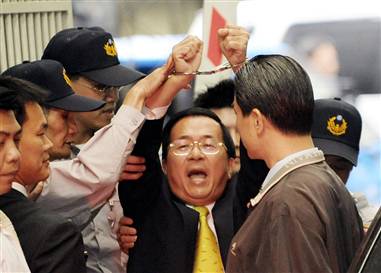Chen Shui-bian Gets His Just Desserts

There was a time when Chen Shui-bian was a rising political star of Asia. He was a masterful campaigner, an astute politician and viewed by some as the champion of the oppressed.
Twice, he won the presidency of the Republic of China, against the better-funded, more-organized Kuomintang (KMT) despite long odds. In 2000, he led the upstart Democratic Progressive Party (DPP) into power in the island's second democratic election, taking advantage of an internal split in the KMT. Four years later, he won by a razor-thin margin aided by a mysterious assassination attempt just two days before the election.
While president, Chen also proved to be incredibly corrupt.
On Friday, Chen was sentenced to life in prison for embezzling $15 million U.S. during his presidency. He had an elaborate setup where he involved family members, including his wife, with a money laundering scheme that'd make the mob proud.
During his second term as president, Chen was busy putting money away while Taiwan's economy went into the tank. His party was routed in the 2008 legislative election, becoming a marginal minority party with fewer than a quarter of the seats. As Chen was barred by the constitution to run for a third term, his successor was beaten soundly by the KMT's Ma Ying-jeou in last year's presidential election.
In his final years in office, as he was trying to cover up the paper trail, Chen unleashed a series of political maneuvers designed to shift the attention of the public: Flogging the corpse of Chiang Kai-shek and stirring up conflict between the islanders and mainlanders; provoking China with frequent rhetoric of Taiwan "independence"; advocating Taiwan's re-admission into the U.N. by holding referendums, all the while knowing it was a purely political stunt.
Chen was dragged out of the office, kicking and screaming. He still has die-hard supporters, who insist on his innocence not because of any shred of evidence but because of their loyalty to a charismatic chameleon, who sold out his principles in exchange for a lucrative retirement. Had Taiwan's judicial authority not detained him swiftly, he surely would've fled, never to return.
The South China Morning Post calls it a tragedy for Taiwan:
The verdict marks the fall of the man once hailed as "Son of Taiwan", the child of a poor farmer who rose to the top, but now dubbed the "shame of Taiwan". As Taiwan's second democratically elected president, he came to power as a leader of some stature, a man seen to embody the hopes of Taiwanese with strong feelings of local identity. Indeed, it was on the back of their support that he became president. He projected the image of an incorruptible champion of Taiwanese nationalism and independence, whose anti-mainland rhetoric froze relations with Beijing.He is now seen to have betrayed their faith by using his position for personal gain. The question now is how much damage his fall from grace has inflicted on the opposition Democratic Progressive Party and the independence movement in Taiwan. There was already a lot of disillusionment with the DPP over its performance in office after it came to power in 2000. Its reign was marked by internal bickering, administrative incompetence and corruption. Because Taiwan had experienced the dictatorship of the Kuomintang regime for so long, many people were prepared to give the DPP the benefit of the doubt. This fund of goodwill was depleted, however, as the party struggled to come to grips with the responsibilities of office.
This is the ultimate tragedy of Chen's conviction. In order to have a viable and vibrant democracy there needs to be a viable opposition capable of credibly contesting power and testing the government. Chen's disgrace of the island's highest office and his party will make it much more difficult for the DPP to recapture power.
(AP Photos)





